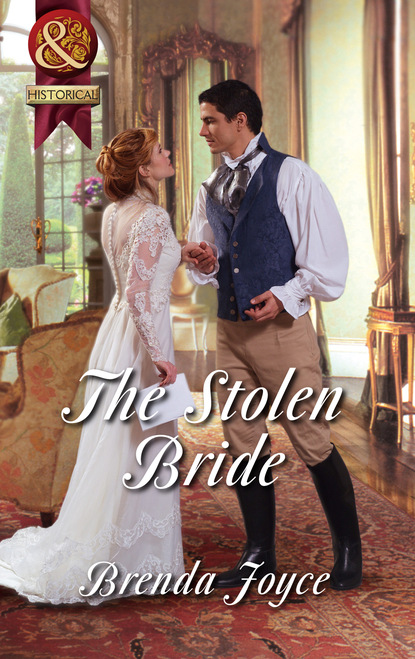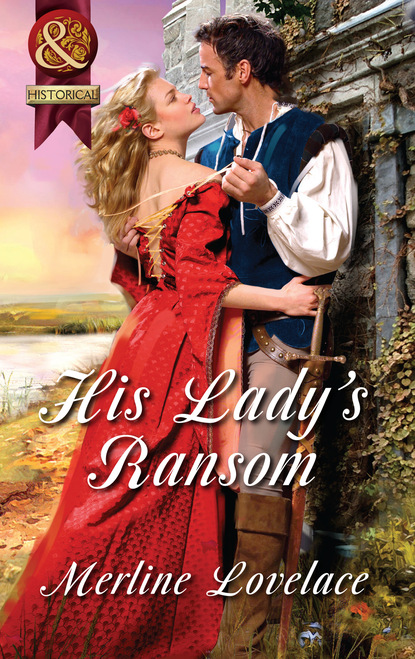
Полная версия
The Perfect Bride
“And it requires his leaving Land’s End,” Mary said emphatically. “However, in May, Edward and I are sharing our twenty-third anniversary here in town. Rex will attend—the entire family will gather for a celebration.”
Blanche smiled. “That sounds wonderful. Congratulations, Mary.”
“I have so many grandchildren, I have lost count,” Mary said softly, her eyes shining. Then she took her hand. “Blanche, I have considered you a daughter ever since your betrothal to Tyrell. I am hoping, very much, that you will one day find the joy and happiness that I have.”
The countess was one of the kindest and most generous women Blanche knew. She was also adored by her husband, her children and grandchildren. She meant her every word, but Blanche was somewhat saddened. She would never find the joy and happiness Mary de Warenne had. Had she the ability to fall in love, she certainly would have done so by now. Gentlemen were always sniffing about Harrington Hall. She could only wonder what it must be like, to be so loved, to love so much, and to be surrounded by such a family.
“I will no longer avoid matrimony,” she said slowly. “There is no point. I simply cannot manage these estates by myself.”
Mary and Lizzie exchanged pleased glances. “Do you have anyone in mind?” Lizzie asked with open excitement.
“No, I don’t.” Blanche realized that half the room had cleared—and it was much easier to breathe now. She fanned herself. “That was a long afternoon!”
“And it is only the beginning.” Lizzie laughed while Blanche felt a moment of dismay. “Well, I have seen a number of interesting prospects. If you wish to gossip, let me know.” Lizzie laughed again, now holding out her hand for Tyrell. He instantly left his group and came to her side, clasping her palm, their gazes meeting briefly in an intimate communication.
“We should go, as you seem very tired, dear,” Mary remarked. The women exchanged hugs and goodbyes.
Blanche then spent the next half hour smiling at the departing gentlemen, doing her best to seem gracious and truly interested in each and every one. The moment her last caller was gone, she went to the nearest chair and collapsed, her smile gone. Her cheeks actually hurt. “How can I do this?” she gasped.
Bess grinned, settling on the sofa. “I thought it went quite well.”
Felicia asked a servant to bring sherry for three. “That went very well,” the voluptuous brunette smiled. “My God, I had forgotten how many dashing men remain eligible!”
“That went well? I have a raging migraine!” Blanche exclaimed. “And by the by, the Earl and Countess Adare will be celebrating their twenty-third anniversary in May.”
Felicia looked surprised; Bess did not. “And Rex de Warenne will attend,” she said.
Blanche looked at her and their gazes held. What did her friend mean?
“Are you certain you want an elderly husband, Blanche?” Bess smiled.
Blanche was uncomfortable. “Yes, I am very certain. Why did you just mention Sir Rex?”
“Oh, hmm, let me see. I was standing behind you while you were discussing Sir Rex with his family,” Bess said pointedly.
Blanche failed to understand. “I am bewildered. I asked after the entire family, Bess. Are you implying I am somehow interested in Sir Rex?”
“I hardly said such a thing,” Bess gasped in mock denial. Then, “Come, Blanche. This isn’t the first time his name has come up.”
“He is a family friend. I have known him for years.” Blanche remained confused. She shrugged. “I have merely wondered why Sir Rex never called. It was a lapse. It was somewhat insulting. That is all.”
Bess sat up straighter. “Do you wish for him to court you?”
Blanche could only stare. Then she started to smile—and briefly, she laughed. “Of course not! I wish for a peaceful future. Sir Rex is a very dark man. Everyone knows he broods—and that he is a recluse. We would never suit. My life is here, in London, his is in Cornwall.”
Bess smiled sweetly. “Really. I have always found him disturbingly sexual.”
Blanche paled. She did not want to know what that meant! And only her friend could get away with such an inappropriate remark. She decided to ignore it. “If anything, I want my old life back,” she said sharply.
“Yes, of course you do. Your old life was just so perfect—doting on your father, and living vicariously through me and Felicia.”
Felicia pulled up an ottoman as they were finally served the sherry. “Bess, I tried to seduce him after Hal died. He is truly a boor. In fact, he was so lacking in charm, he was almost rude. He would be the worst possible candidate for Blanche’s hand.”
Blanche didn’t hesitate to defend him, for she hated malice of any kind. “You mistook an introversion of character, Felicia,” she said gently. “Sir Rex is a gentleman. He has always been the perfect gentleman around me—and perhaps, just perhaps, he did not wish to dally with you.”
Felicia flushed. “The de Warenne men are notorious for their affairs—until they marry. Perhaps he simply isn’t virile.”
“That is a terrible thing to say!” Blanche cried, aghast.
Bess cut in. “He has a reputation for preferring housemaids to noblewomen, Felicia. He also has a reputation for great stamina and skill, never mind his war injury.”
Blanche stared at her friend, aware of heat rising in her cheeks. “That is gossip.” Then, “I do not think it appropriate to discuss Sir Rex this way.”
“Why not? We talk about my lovers all the time—in far more detail.”
“That is different,” Blanche said, but even she realized how lacking her rationale was. She had never thought about Sir Rex in any way except as a family friend, albeit a distant one.
“It is unbelievable that he would bed servants,” Felicia said with condescension. “How crude!”
Blanche felt the heat in her cheeks increase. “It cannot be true.”
“I overheard two maids discussing his prowess very frankly—one of the maids having been the recipient of that prowess,” Bess grinned.
Blanche stared at her, more uneasy now than before. “I really prefer we not discuss Sir Rex.”
“Why are you becoming the prude now?” Bess asked.
“It is reprehensible for a nobleman to dally with the servants,” Felicia said swiftly, obviously determined to be catty.
“Well, I enjoyed my gardener very much,” Bess shot, referring to an old affair.
Blanche didn’t know what to think. She would never judge Sir Rex; it wasn’t her nature to judge and condemn anyone. Still, it wasn’t really acceptable for noblemen to dally with the servants, but now and then, they did. A mistress was acceptable, as long as vast discretion was used. Sir Rex probably kept a mistress. And now she was thinking about Sir Rex in a way she had no wish to continue. How had this conversation begun? Did he really have a reputation for stamina and skill? She truly did not wish to know!
“When was the last time you spoke with Rex de Warenne?” Bess now asked.
This was far safer ground. And Blanche didn’t have to think about it. “At Amanda de Warenne’s comeout—before she married Captain de Warenne.”
Bess gaped. “Are you telling me you have pined for a man you haven’t seen in two years?”
Blanche sighed and smiled. “Bess, I am not pining for him. And that was a year and a half ago. And frankly, I have had enough discussion for one day.” She stood abruptly, her feet hurting, too, forgetting all about the most enigmatic de Warenne.
Bess also rose, but like a terrier with a bone, plunged on. “Darling, do you realize that Sir Rex has not presented himself as a suitor?”
“Of course I do.” She hesitated. “I know what you are thinking—he needs a fortune and a wife, so that lapse is odd. Obviously he is not yet inclined toward matrimony.”
“How old is he?” Bess asked.
“I think he is thirty, but I am not sure. Please, Bess, stop. I can see where you lead. Do not think to match me with Sir Rex!”
“I have distressed you,” Bess finally said. “And you are never dismayed. I am sorry, Blanche. It must be the strain of your comeout. I would never match you against your will—you know that.”
Blanche was relieved. “Yes, I know. But you did begin to worry me—we both know how tenacious you can be. Bess, I cannot bear the strain of these suitors—and it is only the first day. If you do not mind, I am going to retire for the evening.”
Bess hugged her. “Go and have a hot bath. I’ll leave instructions for supper to be sent to your room, and I will see you tomorrow.”
“Thank you.” Blanche smiled at her friend, embraced Felicia and left the two of them alone together, and as they started whispering, she knew they were discussing her. It didn’t matter. They had her best interests at heart and she was truly exhausted. Besides, she had to escape the conversation about Sir Rex. It had been oddly disturbing.
“I SEE YOU ARE SCHEMING,” Felicia declared.
Bess seized her hand. “I think Blanche is finally interested in a man—even if she doesn’t know it. My God—and for how long? I believe she has known him for eight years!”
Felicia gaped. “Surely you do not think she likes Rex de Warenne? He truly is a rude, boorish man with a highly defective character!”
“I was eavesdropping when she spoke to the countess of Adare. I am not sure she even realizes her interest. Her expression changed completely when she began asking about Sir Rex and her color heightened. And Felicia, when is she ever distressed? Or embarrassed by our chats? And she is insulted by his failure to send condolences! No one can insult Blanche.”
Felicia was aghast. “She can do better! How can she prefer him? He is so black.”
“He is very dark—some women prefer brooding men. You are piqued because he turned you down. If Blanche has any interest in Sir Rex, we must do something about it.”
Felicia sighed. “If you are right, if Blanche has any interest in him, then we should do something about it. But, God, I hope you are wrong.” Then, “What are you planning?”
Bess hushed her. “Let me think.” She began to pace.
“He will be in town in May,” Felicia offered.
“May is too far away.”
Silently, Felicia agreed with that.
Bess turned. “You do know the saying—if one can’t lead the pony to the cart, one brings the cart to the pony.”
“They also say one cannot force the horse to drink, even if he is led to the trough.”
“We are going to Cornwall,” Bess said flatly.
Felicia could think of nothing worse. Cornwall was the end of the world—and at this time of year, freezing cold. “Please, no. I have just remarried and I happen to like my new husband.”
Bess waved at her dismissively. “Oh, we will plan a little ladies’ holiday—but when it is time to depart, you will be ill and my daughter will have suffered a riding accident.”
Felicia’s eyes widened.
Bess continued, smiling, “I do think in a week’s time, Blanche will need to escape this crush—in fact, I am certain she will wish to do nothing more. And we, her dearest friends, will convince her to take a holiday at Harrington’s estate in the south.”
“I didn’t know Harrington had an estate in Cornwall.”
“He doesn’t. At least, not that I know of. But I have been helping Blanche sort through the vast fortune she has been left, and I will make a few interesting adjustments to her papers. So you see, there really is a small estate in Cornwall—just kilometers from Land’s End. Imagine what she will have to do when she arrives and realizes there has been a mistake. Surely, surely, Sir Rex will not turn her away.”
Felicia slowly smiled. “You are so bloody brilliant,” she said.
“I am, aren’t I?”
CHAPTER TWO
HE SWUNG HIS HAMMER as hard as he could, driving the nail so deeply into the beam that the head became level with the wood. Sweat blinded his vision and poured down his naked torso. He swung again, and the head of the nail vanished. But Rex knew that the savage physical exertion would not change anything.
Although almost ten years had passed, he saw the Spanish Peninsula as if he was there still. Canons fired from the ridge above, sabers rang, men screamed. Smoke filled the air, blocking out the midday sun. And he ran, horseless, to rescue his friend Tom Mowbray. Suddenly a burning pain exploded in his knee….
Fury and frustration mingled. He didn’t want to recall the war now, or ever again. He flung the hammer aside and it skipped across the hard ground, hitting a supportive column. The men who were helping him build the barn carefully kept at their tasks, ignoring him.
But the letter always rekindled his damned memories and with them, the bloody pain, which he was adept at burying. Rex leaned on his crutch, breathing hard. The worst part was, he desperately needed the letter, and in the light of day he couldn’t regret saving Tom Mowbray’s life, nor could he regret his brief liaison with the woman he had once, foolishly, loved.
He wiped sweat from his brow, some of the fury receding. The past was just that, the past, and it needed to stay buried. But what he could not avoid was the letter about his son.
For even as he dreaded its contents, he was as desperate to read it, too. There would be so much joy—and there would be even more torment.
Rex gave in. The letter had arrived earlier that day and it had been sitting in his study ever since. As he only received one such missive every year, he could no longer delay. He rapidly traversed the structure that would be his breeding barn. Outside, a number of stone buildings faced him, the fourteenth-century chapel behind them. It was a typical Cornish day—the skies above were brilliantly blue and dotted with clouds that might have been spun with cotton, while the moors seemed to stretch away into an eternity, stark, treeless and mostly barren. But even from where he passed, he could glimpse his sheep and cattle in the distance. The sight gave him a moment of hard satisfaction. Closer to where he stood, stone hedges he had laid with his own hands bisected the nearby hills. A prize crop of yearlings raced in one of the pastures, broodmares grazed in another, fat and close to foaling. And always, he could hear the roar of the ocean crashing on the rocks behind him, a staccato reminder of where and who he was.
Bodenick Castle was his home. It had been built in the late sixteenth century upon sheer black cliffs that fell into the ocean below, and was a stark, square structure, with only one tower remaining. He had spent four years renovating it upon first being awarded the manor for his valor in the war, but he had not tried to reconstruct the second tower, where only a few original stones had remained. Local legend held that pirates had taken it down, stone by stone, looking for their buried treasure. Some folk claimed a treasure remained buried there.
A single oak tree graced the castle, while ancient ivy and wild rose bushes crept up its walls. Rex quickly entered the timbered hall.
It was even colder within than outside. He shivered, having forgotten his shirt in the rising barn. Rex hurried into the tower, where his study took up the ground floor. Dread renewed itself.
It was dark inside, for only two small windows illuminated the round room. Rex crossed over to the desk, where his papers were neatly piled in folders, his affairs legibly marked and purposefully categorized. The letter sat front and center on the leather inlaid desktop. He did not have to look at the postmark or the return address to know who it was from—her handwriting was despicably familiar.
The torment exploded in his chest. Stephen was nine years old now. The letter was late—it should have arrived in January. But then, that was Julia, sending him her account of his son’s progress whenever she got to it. She had made it clear the task was one she felt below her.
How was Stephen? Was he still solemn and correct, and determined to excel so he might please the man he believed to be his father?
Did he still prefer mathematics to the classics?
Had they finally hired the fencing master he had recommended?
Rex choked, unable to breathe. He finally sat down on the edge of the desk, his crutch remaining loosely under his right armpit. No longer holding it, he reached for the envelope, trembling.
The memories began to return. He had arrived home after a long rehabilitation in the military hospital, his entire family there to welcome him, along with neighbors and friends. But Julia, his fiancée, had not been there—and she had only visited him twice in the hospital. He had immediately left his family to call on her, but she hadn’t been home. Instead, he had found her at Clarewood, the Mowbray ancestral home—in Tom’s embrace.
Since that long-ago spring day in 1813, he had intended to never set eyes upon either Julia or Mowbray again. He had been determined to ignore their very existence, as if the love-struck couple did not exist—as if she had not been his lover, as if he had not risked life and limb to rescue Tom from a certain death.
But society was a very small, incestuous place. A year or so later, he had heard that the Mowbrays had had their first son—in October. He hadn’t wanted to allow his mind to go there, but the math was almost irrefutable. As he had left Julia just after the New Year, Stephen could so easily be his child, even though Mowbray had been sharing her favors then, too. And then he’d heard the gossip—that the boy was a changeling, adopted or even the son of one of Julia’s lovers. Although both of his parents were impossibly fair, the boy was as dark as a black Irishman.
Stricken, he had sought out the boy at Clarewood, to see for himself. Rex had taken one look at the darkly complexioned child and it had been clear he was a de Warenne.
The de Warenne men took after one of two ancestors. They were either golden or impossibly dark, and usually, they had the brilliantly blue de Warenne eyes. Rex saw a child that could have posed for his brother Tyrell’s childhood portrait—or his own.
They had reached an agreement long ago. It was hardly the first of its kind in the ton. The Mowbrays would raise Stephen, for Julia was insistent, and Mowbray would provide the kind of inheritance that Rex never could. In return for forsaking his child to the couple so Stephen would have a future of wealth and privilege, Rex would be sent annual reports and allowed an occasional visit. The truth, however, was to remain concealed. Mowbray did not want anyone to know that Julia had been with another man.
It was unbelievably ironic, because a decade had passed and Stephen would have far more than a pleasing inheritance from Mowbray. When Clarewood passed on, Tom had inherited the dukedom, for his older brother had died in a shipwreck. More importantly, there were no other children. Apparently, Tom was incapable of fathering his own child. One day, Stephen Mowbray would be the duke of Clarewood, one of the wealthiest and premier lords in the realm.
He was doing what was best for his son. There was no doubt about that. But now, a knife was being twisted ruthlessly in his heart. Rex opened the letter.
As always, Stephen was excelling at every study and every endeavor. He was two levels ahead in his reading and undertaking advanced studies in mathematics, which remained his favorite subject. He was fluent in French, German and Latin, beginning dance instruction and already adept with a saber, enough so that his master wished to enter him in a tourney for those his age. His horsemanship was equally impressive and he had received a Thoroughbred for his birthday. He was already taking meter fences with ease. And recently, Mowbray had taken him on his first fox hunt.
The script had been blurring since he had begun reading the letter. Rex could no longer see—there was another short paragraph to read. Drops of moisture stained the page, which was shaking. He laid the letter down and gave up. Tears streamed but he could not stop them.
He was so tired of pretending that Stephen was not his. He hated these letters—and he wanted to hold his son. He wanted to teach him to jump those fences; he wanted to take him fox-hunting. But how could he? This was for the best. He did not want Stephen exiled to Land’s End as he had been.
He fought for composure. God, if only he could see Stephen, even once. But he had never visited the boy. If he were going to go through with this arrangement, he knew he must keep the greatest distance possible between them. Meeting Stephen as a stranger would be impossible—he was sure the anguish would rip him apart. He would probably wind up in an opium den, and God only knew that he drank too much as it was. Or he would meet the boy and change his mind. How selfish would that be?
And he could try to remind himself that one day Stephen would know the truth, but there was no consolation to be gained. It would be decades before he could ever approach Stephen and tell him the truth of his paternity, unless Mowbray died an early and untimely death. Rex despised Mowbray, but not enough to wish such a fate upon him.
Rex looked at the dark stone walls surrounding him, closing in on him, and felt as if he were being buried alive, there at Bodenick, where he had toiled so tremendously to turn ruins into a lucrative enterprise. But Land’s End had become a place of exile from the moment he had realized he must forsake his son. It did not matter that he had chosen the exile. The day the yearly letter arrived was the day that he always felt the utter hopelessness of his life. It was the day there was never enough air, and that the weight of his life became crushing.
Rex seized his crutch and swung it viciously. The lamp fell to the floor, shattering, and his carefully organized papers flew everywhere. He stood, leaning against the desk for balance, and thrust the crutch violently at the remaining items on his desk. A glass, decanter, paperweight and more papers were swept to the floor.
He panted, closing his eyes, fighting for control. This day would pass. It always did. Tomorrow he would inspect his broodmares, return to work on the new barn, and begin to fill the pond he’d made in the gardens behind the castle tower. His body continued to shudder. His breathing remained hard and labored. The pain and despair clawed at his heart—he could feel talons inside his chest.
He glanced down at the decanter, which had not broken. He bent, the springs in his crutch allowing it to contract as he wished, retrieving the bottle. Long ago he had learned how to use the crutch in every possible way. It was custom-made, with springs and hinges, and he was no longer aware of its existence. It had become an extension of his body. It had become his right leg.
A quarter of the whiskey remained and he drained as much as he could in a single gulp.
A housemaid hurried into the chamber. “My lord!” She cried, taking in the mess he had created with a single, wide-eyed glance.
Rex finished off the contents of the decanter and then placed it on the desk. He slowly looked at his housemaid. There was a better way to forget.
Anne was on her knees, picking up his papers. She was twenty years old, buxom and pretty and very, very lusty. She had come into his employ two months ago, making it clear she wished to do far more than clean his house and launder his clothes. He refused to deny himself pleasure and passion—he could not survive without sex—and had been tiring of the affair he was having with the innkeeper’s widowed daughter. He had instantly hired Anne. Her first chore had been to join him in bed and they had enjoyed themselves immensely—and had been doing so ever since. He hadn’t been her first lover and he would not be her last. He had compensated her for her extra duties by providing extra stores for her family, who were tenant farmers in a neighboring parish, struggling to make ends meet. Her salary was also a generous one.
Recently, though, he had seen her flirting with the village blacksmith, a handsome lad her own age, newly arrived in Lanhadron. He sensed where that was leading and did not mind, as she deserved a home and family of her own. In fact, as long as he could find a new servant—and a new mistress—he would encourage the match and give them a handsome wedding present.












